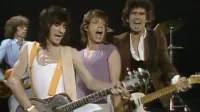A significant factor contributing to a band’s legendary status in music is the presence of a lead singer with a distinctive and memorable voice. Emerging bands, such as Spiritbox and Sleep Token, are aware of this principle and often strive to carve a unique niche for themselves accordingly. Historically, even some of the most prominent musical groups have occasionally allowed other band members to assume vocal duties, a decision that can serve multiple purposes—from light-hearted fun to creating moments of genuine significance.
Regardless of the circumstances surrounding these tracks, they consistently resonate with fans, making a lasting impression. When successful, bands frequently revisit this approach in hopes of recapturing the same magic. In many instances, these songs achieve classic status within a band’s discography. Moreover, while it’s natural for feelings to come into play, such collaborations typically do not pose any problems among band members. As the old adage goes, “If it makes dollars, it makes sense.”
10
Guns N’ Roses – 14 Years (Izzy Stradlin)
Album: Use Your Illusion II (1991)
Watch here
In 1985, Guns N’ Roses formed with rhythm guitarist Izzy Stradlin playing a pivotal role. His contributions spanned the band’s first four albums, and though his involvement diminished after he left in late 1991, his influence is still remembered most notably in the song “14 Years”from Use Your Illusion II. Predominantly featuring Stradlin’s vocals with minimal input from lead singer Axl Rose, this track signifies his enduring legacy with the band.
Although Stradlin’s tenure was relatively brief, fans continue to cherish this piece. He remains celebrated for his role during the band’s apex, particularly during what is often regarded as one of the finest debut albums in history. Stradlin’s induction into the Rock and Roll Hall of Fame alongside his bandmates only further solidified his place in their narrative. Without his influence, “14 Years” might never have graced their live performances, making it a distinctive gem in their catalog.
9
Mötley Crüe – Brandon (Tommy Lee)
Album: Generation Swine (1997)
Watch here
Upon the release of *Generation Swine* in 1997, Mötley Crüe was undergoing significant transformations, marked by the return of lead singer Vince Neil after a hiatus. However, the band took a creative detour on the thirteenth track, where drummer Tommy Lee expressed his heartfelt feelings about his son, Brandon, through song.
While not universally favored among fans, this moment held personal significance for Lee. He subsequently ventured into a solo career, achieving hits like “Hold Me Down,”before returning to Mötley Crüe. Although it is uncertain if Lee will pursue further solo endeavors, his vocal talent certainly merits attention.
8
Motörhead – Step Down (Eddie Clarke)
Album: Bomber (1979)
Watch here
Motörhead’s legacy as one of the greatest metal bands was cemented by their prolific output spanning 23 albums over four decades, anchored by the iconic Lemmy Kilmister. However, in a surprising move in 1979, guitarist Eddie Clarke took the lead vocals for the track “Step Down.”This choice, as outlined in Lemmy’s memoir, was spurred by Clarke’s desire for greater recognition and opportunity.
Lemmy’s willingness to share the spotlight exemplified true leadership, though relations between him and Clarke eventually soured. Nonetheless, Clarke’s contribution to Motörhead’s history remains an unforgettable chapter, showcasing his vocal talent to fans.
7
The Police – On Any Other Day (Stewart Copeland)
Album: Reggatta de Blanc (1979)
Watch here
From 1977 to 1984, The Police captivated audiences worldwide with hits like “Roxanne”and “Every Breath You Take.”Their second album, *Reggatta de Blanc*, featured an unusual departure for the band: drummer Stewart Copeland took center stage with lead vocals on “On Any Other Day.”
While Sting remained the band’s iconic lead singer, this track allowed Copeland to showcase his vocal prowess. The song’s satirical tone added a refreshing contrast to the album’s overall vibe. Earning their place in the Rock and Roll Hall of Fame in 2003, The Police’s musical journey remains storied and impactful.
6
Fleetwood Mac – You Make Loving Fun (Christine McVie)
Album: Rumours (1977)
Watch here
Today, Fleetwood Mac ranks among the top bands in history, largely due to the impactful changes they made in their lineup. The inclusion of guitarist Lindsey Buckingham and vocalist Stevie Nicks transformed the group’s direction. Although Nicks often took the lead vocal role, Christine McVie also left her mark, particularly with her hit “You Make Loving Fun”from the iconic album *Rumours*.
This album, one of the best-selling records of all time, boasts over 40 million copies sold and is crucial in establishing Fleetwood Mac’s legacy. While Stevie Nicks captures mainstream attention, McVie’s contributions showcase her undeniable talent, and “You Make Loving Fun”served as the perfect platform for her vocal abilities.
5
Van Halen – How Many Say I (Eddie Van Halen)
Album: Van Halen III (1998)
Watch here
In 1998, Van Halen was on their third lead singer, Gary Cherone, while preparing to release their eleventh album. While commercially successful, the most noteworthy moment resided in the final track, “How Many Say I,”a poignant piano ballad featuring the vocals of the renowned guitarist Eddie Van Halen.
This song presented a rare opportunity for Eddie to display his vocal talent, which is especially meaningful following his passing in 2020. Fans of Van Halen hold this track close, and they continue to enjoy the music of Eddie’s son, Wolfgang, who carries on the family’s musical legacy with his band, Mammoth WVH.
4
Black Sabbath – Swinging The Chain (Bill Ward)
Album: Never Say Die! (1978)
Watch here
Since their debut in 1970, Black Sabbath captivated fans but faced internal challenges, especially leading to their 1978 album *Never Say Die!*. Tensions with lead vocalist Ozzy Osbourne surfaced, resulting in a temporary departure. When Osbourne returned, drummer Bill Ward stepped into the limelight to sing “Swinging the Chain,”as the band sought to utilize material partly written with another collaborator.
This experience allowed Ward to showcase his talent, offering a rare moment where he led the band. Ultimately, the transition opened doors for new members like Ronnie James Dio in subsequent albums while maintaining Ozzy’s legacy in the band until his return for a final album in 2013.
3
KISS – Beth (Peter Criss)
Album: Destroyer (1976)
Watch here
KISS is synonymous with flamboyant performances and elaborate stage shows, leaving a significant mark on rock music over four decades. Among their notable hits is “Beth,”a standout track that achieved massive commercial success and helped solidify their status. What makes this song unique is that it highlights drummer Peter Criss’s vocal talent rather than the classic leads from Paul Stanley or Gene Simmons.
Consequently, “Beth”became a signature song for Criss, who famously performed it live at the piano. Its popularity established it as a permanent fixture in KISS concerts, being performed over 1,000 times despite Criss’s departure from the band. Recently, drummer Eric Singer has taken on this task, continuing the legacy of this beloved track.
2
The Rolling Stones – In Another Land (Bill Wyman)
Album: Their Satanic Majesties Request (1967)
Watch here
The Rolling Stones have secured their status as one of the most influential bands due to their willingness to embrace risks and incorporate diverse musical styles into their work. One such bold decision was featuring bassist Bill Wyman as the lead vocalist on “In Another Land,”a track from their sixth studio album, *Their Satanic Majesties Request*.
This song marked a significant shift as Wyman stepped into the spotlight, although it did not achieve the commercial heights of other Rolling Stones hits. However, the album itself turned gold, and Wyman’s contribution remains a noteworthy aspect of the band’s experimental endeavors.
1
Blue Öyster Cult – (Don’t Fear) The Reaper (Buck Dharma)
Album: Agents Of Fortune (1976)
Watch here
As Blue Öyster Cult’s most recognized song, “(Don’t Fear) The Reaper”boasts an impressive 6x Platinum certification and over 400 million streams on Spotify. This iconic track was penned and performed by guitarist Buck Dharma, who established himself as a significant contributor to the band’s success, also writing hits like “Godzilla”and “Burnin’ For You.”
Remarkably, the band has performed “(Don’t Fear) The Reaper”over 2,500 times, illustrating its importance within their repertoire. As Blue Öyster Cult continues to create new music, there’s always the potential for Dharma to replicate his success in future releases. Regardless, he can take pride in having composed one of rock music’s most enduring classics.


